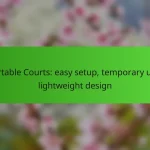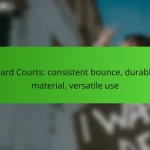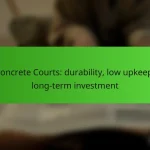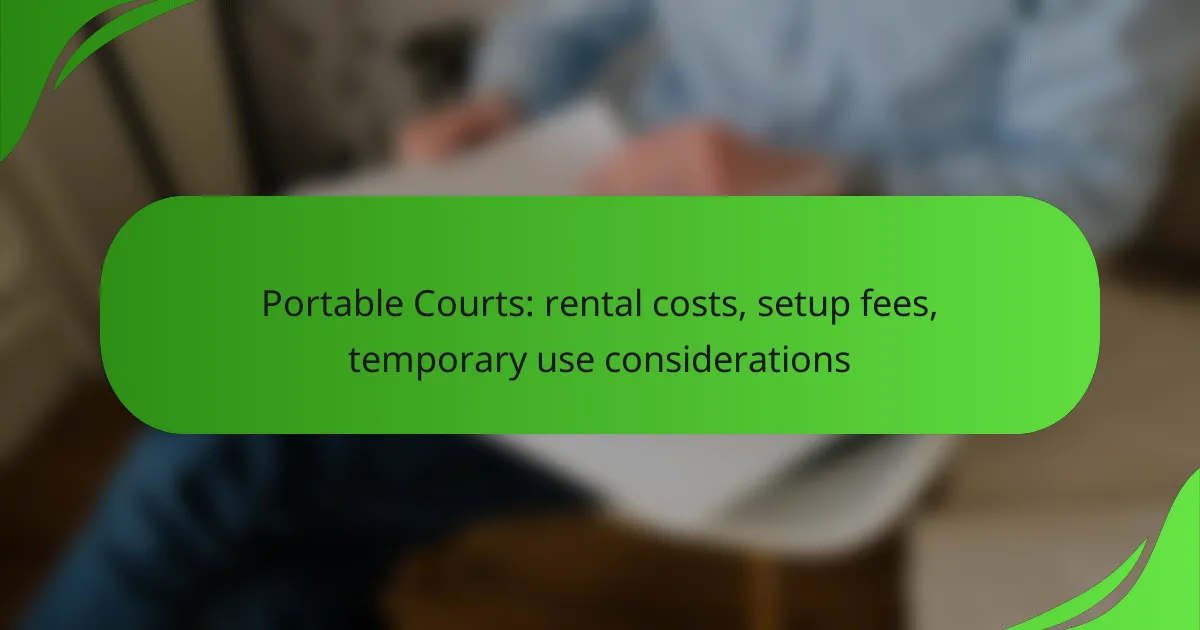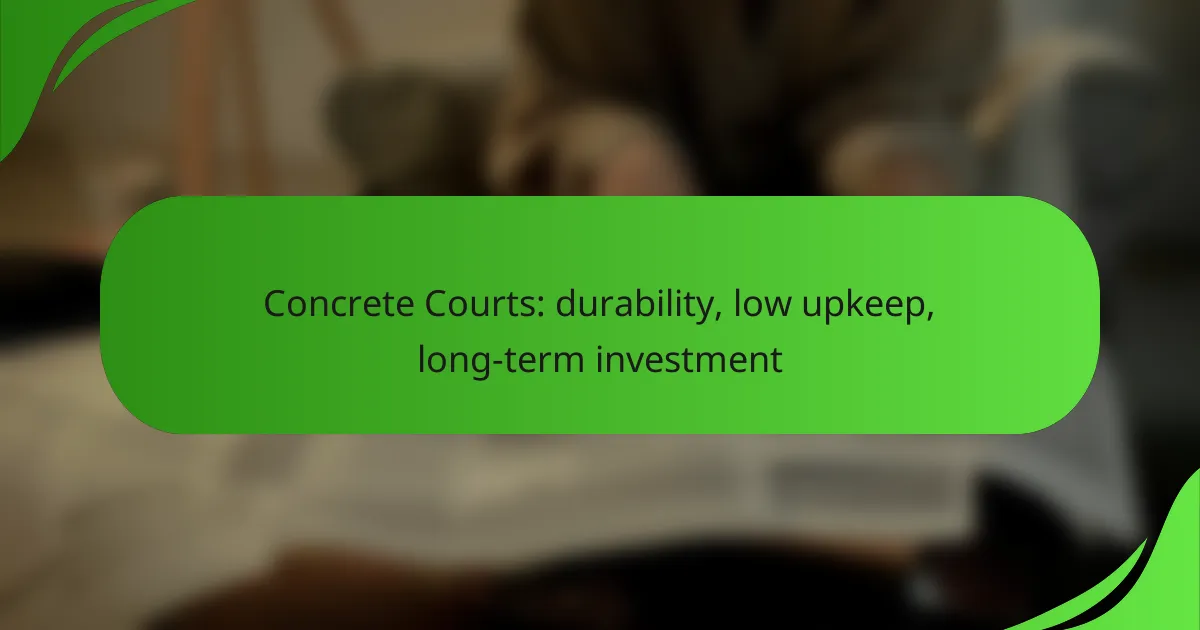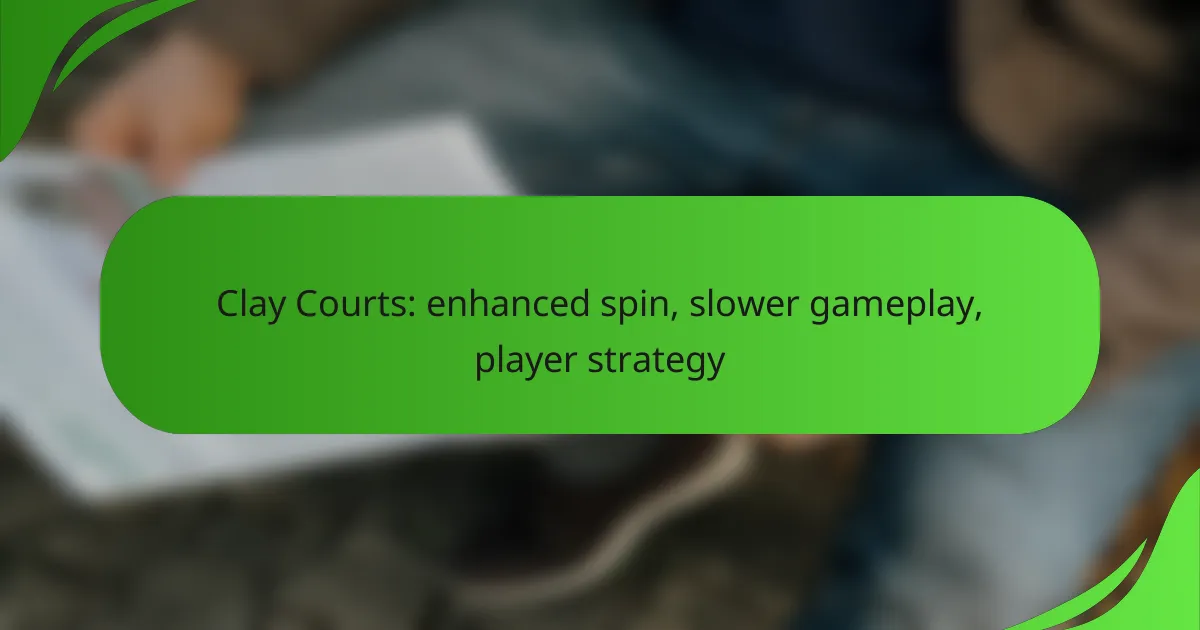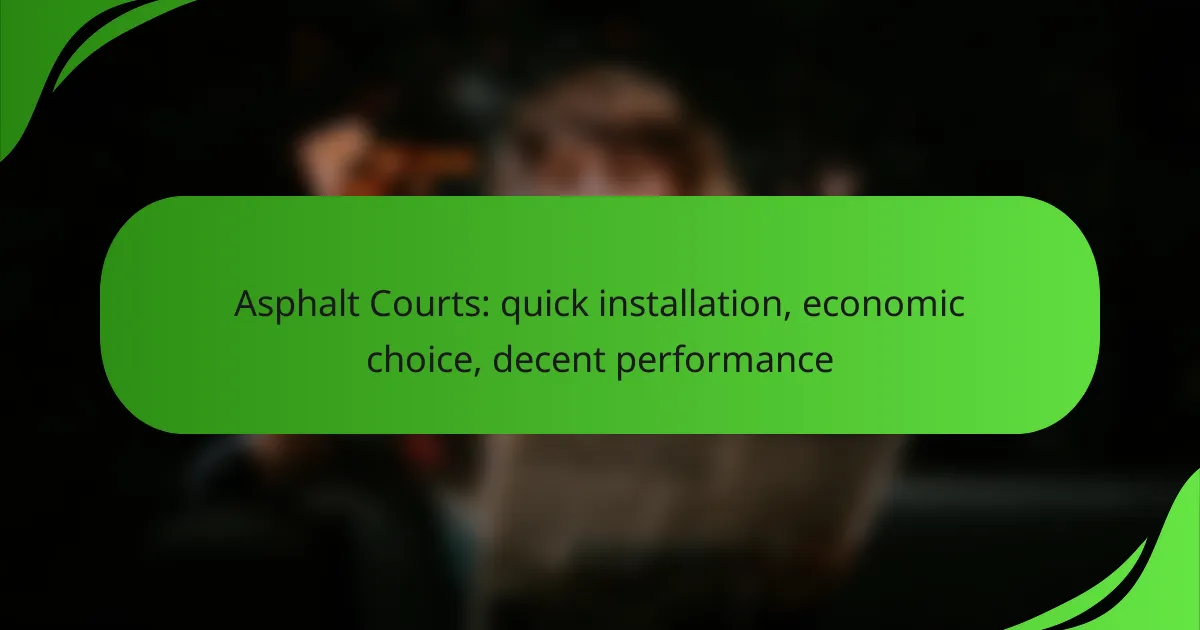When planning to rent portable courts, it’s essential to consider the rental costs, which can vary widely based on factors such as court type, duration, and location. Additionally, setup fees are an important aspect, covering the labor and equipment needed for installation. Proper planning also involves understanding necessary permits, insurance requirements, and site preparation to ensure a smooth temporary use experience.
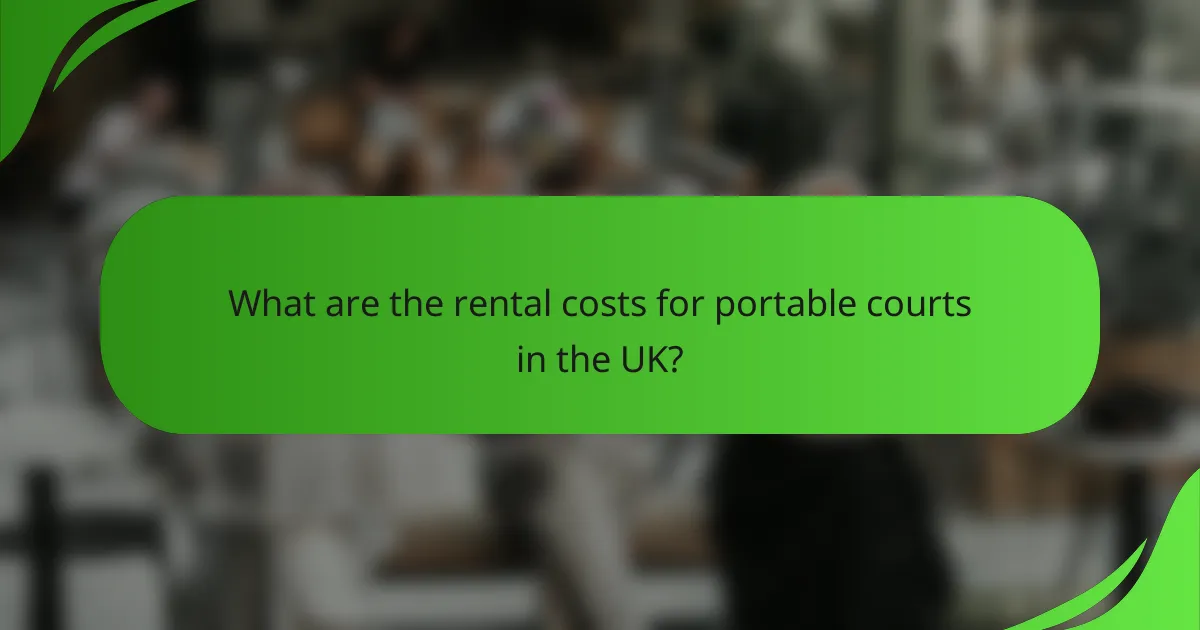
What are the rental costs for portable courts in the UK?
The rental costs for portable courts in the UK can vary significantly based on several factors, including the type of court, duration of use, and location. Generally, prices can range from a few hundred to several thousand pounds, depending on the specifics of the rental agreement.
Average rental prices
On average, renting a portable court in the UK typically costs between £500 and £2,000 for a short-term event. For longer-term rentals, such as a season or several months, costs may range from £1,500 to £5,000 or more. These prices often include basic setup and takedown services.
Specialized courts, like those for tennis or basketball, may command higher fees due to additional equipment and maintenance requirements. Always confirm what is included in the rental price to avoid unexpected costs.
Factors affecting rental costs
Several factors can influence the rental costs of portable courts. The type of sport, the size of the court, and the specific features required (like lighting or flooring) can all affect pricing. Additionally, the rental company’s reputation and the quality of their equipment may also play a role.
Location is another critical factor; courts in urban areas may be more expensive due to higher demand and logistics costs. Always compare quotes from multiple providers to ensure you get the best deal.
Seasonal pricing variations
Rental prices for portable courts can fluctuate based on the season. During peak sports seasons, such as summer for tennis or winter for indoor sports, prices may increase due to higher demand. Conversely, off-peak periods might offer lower rates, making it a good time to rent if flexibility allows.
Consider booking well in advance during peak times to secure better rates and availability. Some companies may offer discounts for early bookings or package deals for multiple rentals, so inquire about any promotions that could reduce costs.
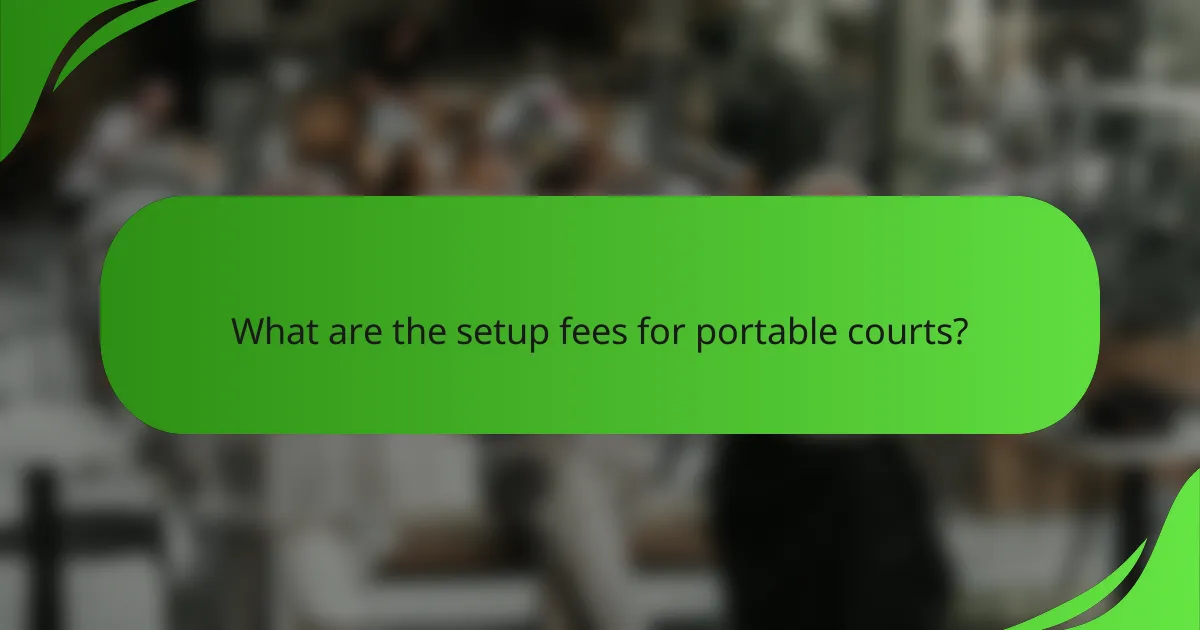
What are the setup fees for portable courts?
Setup fees for portable courts can vary significantly based on location, court type, and rental duration. Typically, these fees cover the labor and equipment needed to install the court at your chosen site.
Typical setup fees
Typical setup fees for portable courts range from a few hundred to over a thousand dollars, depending on the complexity of the installation. For example, basic setups for smaller courts may cost around $300, while larger or more intricate configurations can exceed $1,000.
Factors influencing these fees include the type of surface (e.g., hardwood, synthetic), the location of the installation, and any specific requirements for the event. Always request a detailed quote to understand the full scope of the costs involved.
Additional costs for equipment
In addition to setup fees, you may incur extra costs for rental equipment such as nets, padding, and lighting. These items can add anywhere from $100 to several hundred dollars to your overall rental cost, depending on the quality and quantity needed.
Consider whether you need additional features like scoreboards or seating, which can further increase your expenses. It’s wise to compare rental packages that include equipment to potentially save on overall costs.
Discounts for long-term rentals
Many rental companies offer discounts for long-term rentals, which can significantly reduce your overall expenses. For instance, renting a portable court for a week may yield a discount of 10-20% compared to daily rates.
When planning an event or tournament, inquire about these discounts upfront. Booking well in advance can also enhance your chances of securing better rates and availability.
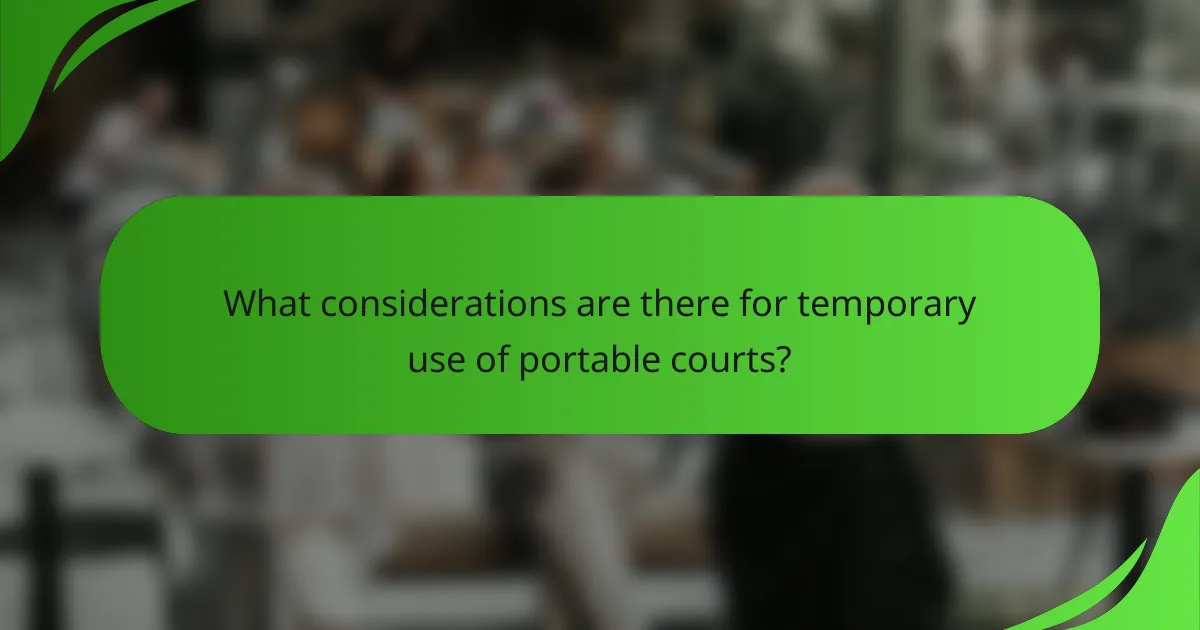
What considerations are there for temporary use of portable courts?
When considering the temporary use of portable courts, key factors include obtaining necessary permits, understanding insurance requirements, and ensuring proper site preparation. Each of these elements plays a crucial role in the successful setup and operation of portable courts.
Permits and regulations
Before setting up portable courts, check local regulations regarding permits. Many municipalities require permits for temporary structures, which can involve submitting plans and paying fees that vary widely based on location.
Additionally, ensure compliance with zoning laws and any specific requirements for sports facilities. This may include restrictions on noise levels or hours of operation, which can affect your planning.
Insurance requirements
Insurance is essential for protecting against potential liabilities associated with portable courts. Most venues will require proof of liability insurance, which typically covers injuries or damages that occur during use.
Consult with an insurance provider to determine the appropriate coverage levels, which can vary based on the size of the event and the number of participants. It’s advisable to include coverage for property damage and personal injury to mitigate risks effectively.
Site preparation needs
Proper site preparation is critical for the safe and effective use of portable courts. This includes assessing the ground surface to ensure it is level and stable, which helps prevent accidents and equipment damage.
Consider factors such as drainage, accessibility, and proximity to utilities. If the site is grassy or uneven, additional materials like mats or leveling equipment may be necessary to create a suitable playing surface.
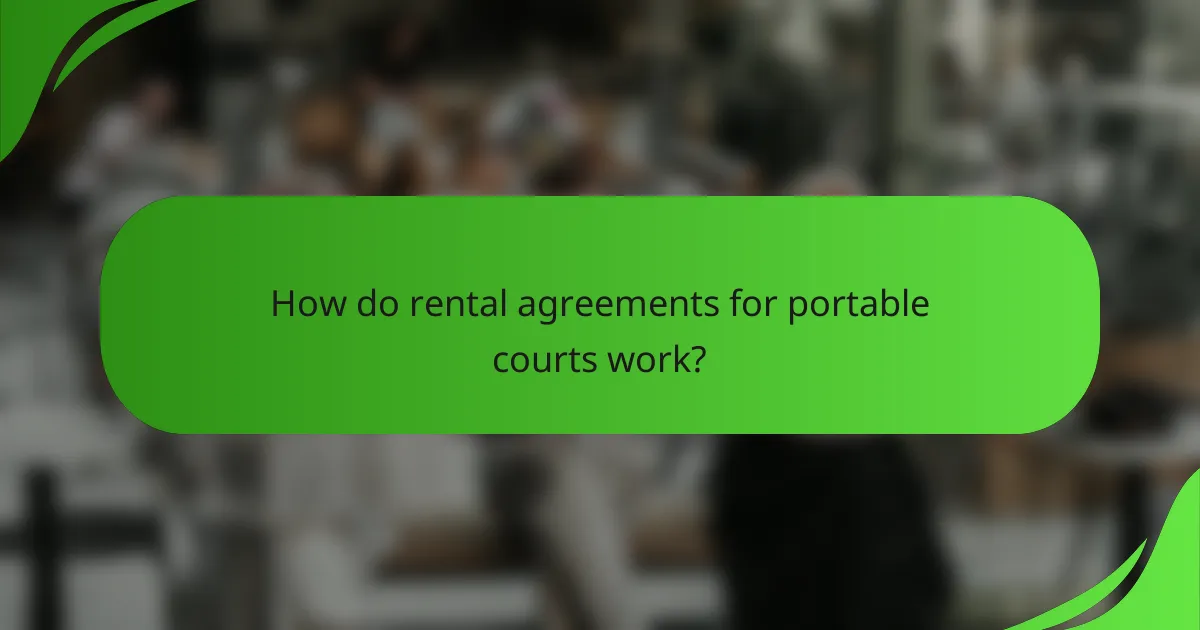
How do rental agreements for portable courts work?
Rental agreements for portable courts typically outline the terms for temporary use, including costs, setup, and responsibilities of both parties. These contracts ensure clarity on usage duration, payment structures, and any additional fees that may apply.
Standard terms and conditions
Standard terms and conditions for portable court rentals usually cover the rental period, payment methods, and maintenance responsibilities. Rental fees can vary widely, often ranging from a few hundred to several thousand dollars, depending on the court type and duration of use.
It is common for agreements to specify the setup and takedown times, which may incur additional charges if not adhered to. Clients should carefully review these terms to avoid unexpected costs.
Cancellation policies
Cancellation policies for portable court rentals often stipulate a notice period, typically ranging from 48 hours to a week. If a cancellation occurs within this timeframe, clients may face penalties, such as losing their deposit or paying a percentage of the rental fee.
Understanding these policies is crucial, especially during peak seasons when demand is high. Clients should consider purchasing cancellation insurance if available, to mitigate potential losses.
Liability clauses
Liability clauses in rental agreements often outline the responsibilities of both parties in case of damage or injury. Typically, renters are required to maintain insurance coverage to protect against potential claims during the rental period.
It is advisable for clients to review these clauses carefully, as they may be held liable for any damages incurred while using the court. Ensuring adequate insurance coverage can help mitigate financial risks associated with accidents or property damage.

What are the best portable court providers in the UK?
The best portable court providers in the UK offer a range of options for temporary sports facilities, catering to various sports and events. Key players in this market provide flexible rental agreements, setup assistance, and quality equipment to meet diverse needs.
Top companies for rental
Some of the leading companies for portable court rentals in the UK include Sports Courts UK, Portable Sports Solutions, and Event Court Rentals. These providers typically offer a variety of court types, including basketball, tennis, and multi-sport configurations.
Rental costs can vary significantly based on the type of court and duration of use, generally ranging from a few hundred to several thousand pounds. It’s advisable to compare quotes and services to find the best fit for your event.
Customer reviews and ratings
Customer feedback is crucial when selecting a portable court provider. Many users highlight the quality of the courts and the professionalism of the setup teams. Ratings on platforms like Trustpilot or Google Reviews often reflect satisfaction with both the product and customer service.
Look for providers with consistently high ratings, ideally above 4 stars, as this often indicates reliability and quality. Reading detailed reviews can also provide insights into any potential issues or advantages specific to each company.
Service areas covered
Most portable court providers in the UK cover a wide range of service areas, including major cities like London, Manchester, and Birmingham. However, availability may vary based on location, so it’s essential to confirm with the provider if they service your specific area.
Some companies may charge additional fees for delivery and setup outside of their standard service zones. Always inquire about these potential costs when planning your event to avoid unexpected expenses.
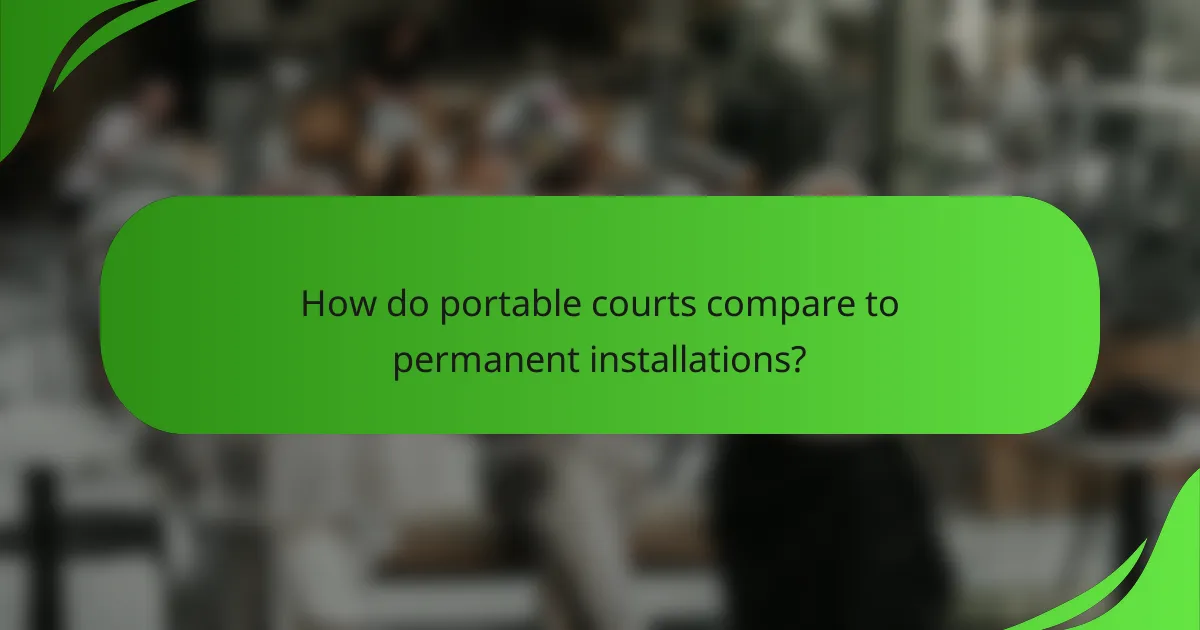
How do portable courts compare to permanent installations?
Portable courts offer a flexible and often more affordable alternative to permanent installations, making them suitable for temporary events or locations. While permanent courts provide durability and long-term use, portable options can be set up and dismantled quickly, catering to varying needs.
Cost-effectiveness
Portable courts typically have lower initial costs compared to permanent installations, which require significant investment in construction and materials. Rental fees for portable courts can range from a few hundred to several thousand dollars, depending on the duration and specific features required.
In addition to lower rental costs, portable courts often eliminate the need for ongoing maintenance expenses associated with permanent installations. This makes them an attractive option for organizations or events with limited budgets.
Flexibility and mobility
One of the main advantages of portable courts is their flexibility; they can be set up in various locations, such as gyms, parks, or community centers. This mobility allows for the hosting of events in different areas without the commitment of a permanent installation.
Moreover, portable courts can be customized for different sports or activities, making them versatile for various events. However, it’s essential to consider logistics, such as transportation and setup time, which can vary based on the court’s size and complexity.
